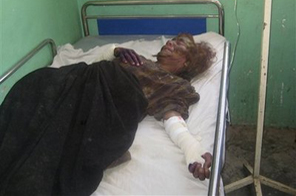Afghan Civilian deaths up by 24%
GENEVA : The United Nations said Friday the number of civilians killed in conflict in Afghanistan has jumped 24 percent so far this year, with bombings by insurgents and airstrikes by international forces the biggest single killers.
In a grim assessment of the first half of 2009, the U.N.
assistance mission in Afghanistan said the Taliban and other anti-government militants have become more deadly by shifting from ambush attacks to suicide bombings, roadside explosives and targeted assassinations.
It warned that more civilians would likely be killed as insurgents try to battle a troop increase by the administration of President Barack Obama, and seek to destabilize the country before presidential and Provincial Council elections on Aug. 20. The summer is also typically the worst for fighting in Afghanistan.
Insurgent attacks are "frequently undertaken regardless of the impact on civilians in terms of deaths and injuries, or destruction of civilian infrastructure," the 21-page report said, ascribing 595 civilian deaths to the Taliban and other "anti-government elements" over the first six months.
Many of those died in suicide attacks or roadside bombs near "civilian traffic, residential compounds and marketplaces." The United States and Western powers have become more deadly, too, partly because insurgent groups are taking cover in residential areas or luring U.S.-led forces into unintentionally killing civilians, the U.N. said.
The Taliban and others are "basing themselves in civilian areas so as to deliberately blur the distinction between combatants and civilians, and as part of what appears to be an active policy aimed at drawing a military response to areas where there is a high likelihood that civilians will be killed or injured." The report said international forces have given high priority to minimizing civilian casualties, but along with Afghan forces have killed 310 civilians. Of those, 200 were killed in 40 airstrikes.
The total death toll - including those which couldn't be attributed to either side - of 1,013 civilians is 24 percent higher than in the same period in 2008, and 48 percent higher than in 2007.
The U.N. tally is higher than an Associated Press count of civilian deaths based on reports from Afghan and international officials showing that 453 civilians have been killed in insurgent attacks this year, and 199 civilians died from attacks by Afghan or international forces. An Afghan human rights group says an additional 69 civilians died during a U.S. attack in Farah province in May, but the U.S. disputes those deaths.
Along with insurgents and Western nations, the government of Afghanistan shares responsibility "for a rising toll in terms of civilian deaths and injuries and destruction of infrastructure, including homes and assets, which are essential for survival and the maintenance of livelihoods." The report said civilian deaths rose every month this year as compared with 2008 except February, as insurgent forces sustained attacks throughout the winter in a break from previous years when there was a lull in fighting. Other factors were the increased fighting in urban areas, more complex Taliban attacks and the return of militants fleeing warfare across the border in Pakistan. The intensified operations by U.S. forces was also cited.
May was the deadliest month, with 261 civilians killed. The Taliban and other insurgents were responsible for most of the deaths, but 81 were killed by government or international forces, the U.N. said.
The South has been the worst region as a result of instability in Pakistan and the increase in U.S. activity. Only six civilians were killed in the West.






